What’s Student Visa?
What’s Student Visa?It is necessary to get a student visa to study as a student in Japan for long term.
- A college student visa allows for a stay of one year (one year and three months) in Japan in order to study Japanese. It can be extended up to a maximum of two years. *Those who want to study Japanese as a hobby can get a student visa too Want to go to university
- Enrollment period: January, April, July, and October
- you can apply for a student visa without any inquiety as our school is admitted as a model Japanese school by the immigration bureau.

Features

Process for admission

Curriculum Level

Schedule For The Next Stage Of Education

Support for
Next Step
Scholarship

A day of students

accommodation
-

Activities
Features for long term course
Features

Long Term Course
This course is for the purpose of continuing on to college or graduate school in Japan.
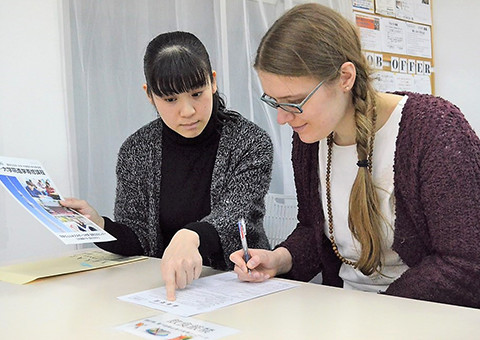
Support for
Next Step
There are special classes held before the two tests that review questions from past tests.
In order to get into your school of choice, we provide overall guidance and specific guidance for your situation.
We help with correcting entrance essays, creating necessary materials, and practicing for entrance interviews.
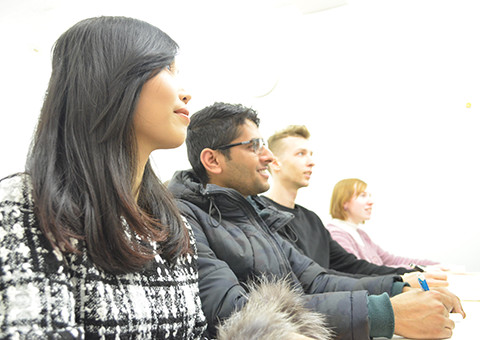
Lessons preparing for the JLPT and EJU
Upon completion of the beginner level, students proceed to expand their vocabulary and cultivate grammatical skills with an eye towards passage of Japanese Language Proficiency Test levels N1, N2, and N3.
You study for JLPT and EJU in the class, and also
Process for admission
Application Procedure
In order to obtain a college student visa, certain documents must be submitted to Immigration Bureau of Japan
Application Procedures

- Application Preparation / Explanatory Meeting
- Apply for Visa to Immigration Bureau of Japan
- Interview
- Review of application by Immigration Bureau of Japan
- Issuance of “the Certificate of Eligibility” from Immigration Bureau of Japan
- Beginning of Class
Necessary Documents
Documents Needed from the Student Applying
- Application Form (Provided by TIJS)
- Personal History Form (Provided by TIJS)
- A Photograph
- Diploma, School Transcript
- Japanese Study Certificates (for example, a JLPT certificate)
- Certificate of School Attendance, Certificate of Employment
- Passport
Documents Needed from the Student’s financial supporter
- Explanation of Fee Payment(Provided by TIJS)
- Document Proving the Relationship Between the Applicant and the financial supporter
- Certificate of bank balance
- Certificate of Employment
- Certificate of Income and Taxication
*In general, the above are the required documents; but based on your nationality or country of residence, different documents may be required.
*Please confirm the details when applying.
Fee
- Preliminary Cost: the screening fee for the documents to hand in to the immigration bureau
- Screeing Fee: \30,000
- Secondary Cost: Paid Upon Delivery of your Acceptance into School
- Entrance Fee: \50,000 (only once)
- Tuition fee: ¥750,000 /one year
Time Schedule
- Morning class/ 8:50 - 12:30 Mon to Fri (except for nationall holidays)
Or - Afternoon class/ 12:50 to 16:30 Mon to Fri ( except for national holidays)
Curriculum Level
Curriculum Level
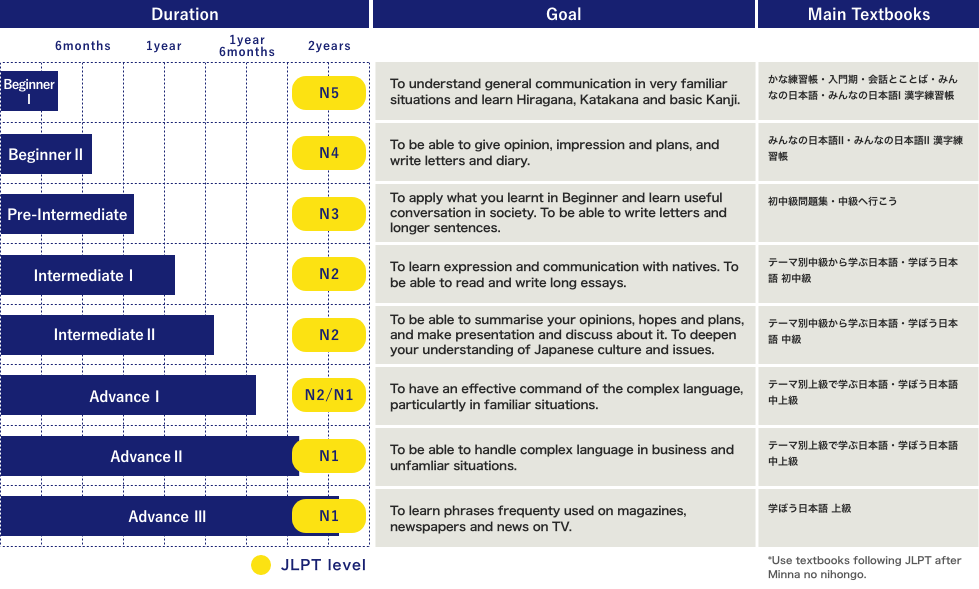
Support for
Next Step
Guidance
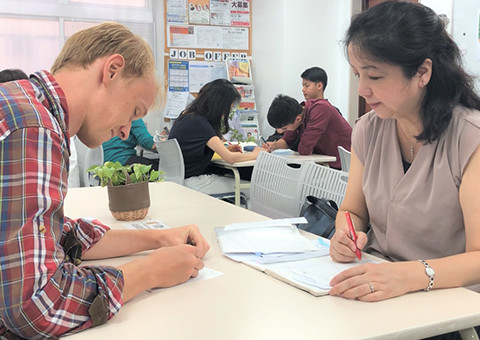
We support students who want to go to Japanese Universities, graduate schools, and vocational schools.
Our experienced teachers carefully help students decide upon a school to which to apply.
1Counseling for higher educations
We have many guides for university, graduate school, vocational school and entrance exam questions. In addition, there is an examination report that summarizes the questions and answers of exam items, essay themes, and interview exams of each school, and you can browse freely.
we conduct school counseling, mock interviews, mock exams, and dissertation guidance as a part of the class.
- We have many application brochures and guidebooks for colleges all over Japan.
- We provide you with the necessary information for taking the entrance exam for your desired college.
- You can look through past Japanese exam questions and entrance application essay themes.
- We have a list where you can see the EJU scores needed to enter different universities. Data from alumini has been used to create these lists.
- Making contact with a professor is important to enter graduated schools. You can ask seniors about the information of professors at the graduated schools which you want to enter.
2Advice for writing essays and a thesis
If you want to go take master degree in Japan, you need not only the specific knowledge but also Advanced Japanese reading comprehension and expressive skills. In our school, the veteran teachers of the examination guidance perform the student's thesis preparation guidance and the correction individually.
We place importance on compastion traning and "The "Composition presentation Session" where the students present their thisis in front of their classmate, is held as a class. These thisis will be made up in a book and offered to the graduating students.
3Practice Interview
In the entrance exam, the emphasis is on interviews, but you can prepare not only individual interview guidance but also “mock interviews” for actual interview exams separately.
- We provide you with concrete information about the entrance process (interview questions, test themes, essay themes, etc) taken from previous students who went through the process.
Schedule For The Next Stage Of Education
Schedule For The Next Stage Of Education
When you want to go to a college later holding a student visa, the students of April session will study for 2 years, of July session is 1 year and 9 months, of October session is one year and 6 months and of January session is 1 year and 3 months. Our vetran teacher who has a lot of experience will help and guide you to go to the college that you wish.
Schedule For The Next Stage Of Education
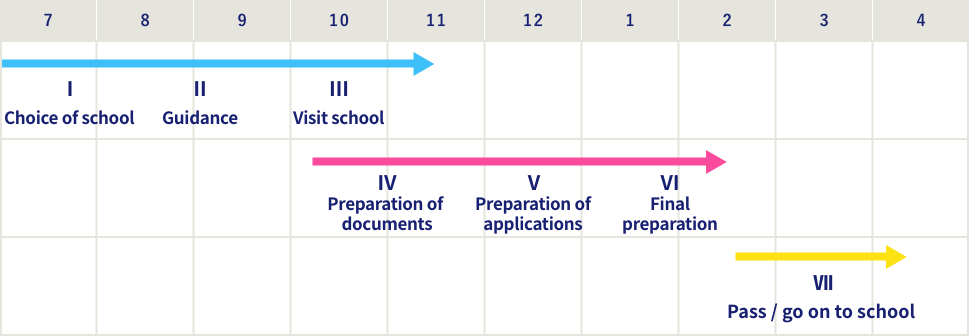
Ⅰ
School Selection
Browsing and searching
In TIJS’s College Corner, there are pamphlets about different schools, past entrance exam tests, information about interviews, and information about the scores needed on the EJU in order to get into different schools. Students are able to look at this information anytime. The experiences of past students graduating from TIJS are also available.
Ⅱ
Guidance
We will narrow down your desired school based on individual consultation.
We will provide guidance based on your school of choice, along with helping you with the application procedures. Our teachers will answer all of your questions.
Ⅲ
College Visit
Based on a campus visit, you will decide upon the schools you will apply to. There are materials about campus visits in the College Corner in TIJS.
Ⅳ
Document Preparation
After requesting the application materials from your desired college, we will help you prepare the needed documents.
Ⅴ
Application Preparation
After filling out the application, our teachers will review it for you.
We will give you advice corresponding to the specific school you are applying for.
We will give you advice on preparing the “Reason for Application” document. For graduate schools, we help you with the Research Plan application and how to make contact with your professor.
Ⅵ
Final Preparation
Through practice interviews, we help you with questions you will be asked during the real interview, as well as using words and manners appropriate for an interview. Through repeated practice, you will learn how to respond to many questions.
Ⅶ
Advancing on to College
After being accepted into college, we will support you with the necessary paperwork and visa change.
Actual College Acceptance Results
Achievements
Graduate Schools
Public
The University of Tokyo, Tokyo Institute of Technology, Tokyo University of Foreign Studies, Ochanomizu University, Tokyo Metropolitan University, Yokohama National University, Hitotsubahsi University, Chiba University, University of Tsukuba, Shizuoka University, Mie University, Kyoto University
Private
Waseda University, Rikkyo University, Chuo University, Nihon University, Kokushikan University, J.F. Oberlin University, Daito Bunka University, Josai University, Mejiro University, Bunka Gakuen University, Digital Hollywood University
Universities
Public
The University of Tokyo, Tokyo Institute of Technology, Tokyo University of Foreign Studies, Tokyo Gakugei University, Ochanomizu University, Tokyo Metropolitan University, Yokohama National University, Chiba University, Saitama University, Takasaki City University of Economics, Fukushima University, Kyoto University, Osaka University, Shiga University
Private
Waseda University, Keio University, Rikkyo University, Chuo University, Meiji University, Hosei University, Meiji Gakuin University, Tokyo Women’s Medical University, Tokyo University of Science, Tokyo University of Agriculture, Gakushuin University, Nihon University, Dokkyo University, Toyo University, Senshu University, Komazawa University, Kokushikan University, Nishogakusha University, Asia University, Kanagawa University, Takushoku University, Chuogakuin University, Kanto Gakuin University, Kanagawa Institute of Technology, Rissho University, Tokyo Kasei University, Musashino Art University, Shibaura Institute of Technology, Nippon Institute of Technology, Meikai University, Reitaku University, Ryutsu Keizai University, Kyorin University, Takachiho University, Jobu University, Josai University, Josai International University, Gakushuin Women’s College, Bunka Gakuen University, Musashino University, Mejiro University, Wako University, Digital Hollywood University, Ritsumeikan Asia Pacific University
Junior College
Yamamura Gakuen Junior College, Kokusai Junior College, Yokohama Soei Junior College, Kaetsu Junior College, Aoba Gakuen Junior College
Vocational schools
Ouji-Keiri Senmongakkou, Tokyo College of Child & Social Welfare, Nihon Kenko Iryo Senmongakkou, Hattori Nutrition College, Bunka Institute of Language, Sundai Travel and Hotel College, Oda Seika Senmongakkou, International College of Tourism, Tokyo Communication Arts College, Bunk Fashion College, Tokyo Mode Gakuen, Murata bookkeeping School, Dressmaker Gakuin, Toyo Institute of Art and Design, Hollywood University of Beauty & Fashion, Tokyo Kougyou Senmongakkou, Daiichi Keiri Senmongakkou, Tokyo Kokusai Jouhou Business Senmongakkou, Tokyo Shinri Ongakuryouhou Fukushi Senmongakkou, and more
Scholarship System
Scholarship
Students who have excellent grades and attendance rates have the possiblity of receiving a scholarship.
| Scholarship | Duration | Requirement |
|---|---|---|
| TIJS Scholarship | irregular | Students who have excellent grades and attendance rates |
| Japanese Language Education Organization Scholarship for College-visa Student Japanese Language Education Organization Scholarship for College-visa Student | 1 year | Recommendation (Good attendance records, excellent school grades.) |
| Scholarship for Financially Self-supported International Students | 1 year(After graduation from TIJS) | Recommendation (Good attendance records, excellent school grades.) |
| Scholarship for Financially Self-supported International Students | 1 year(After graduation from TIJS) | Excellent EJU test results |
| Scholarship for financially self-support International Student with excellent JLPT | 2 years(After graduation from TIJS) | Students who will be majoring in a field related to Japanese in college or graduate school |
| Scholarship | TIJS Scholarship | Japanese Language Education Organization Scholarship for College-visa Student Japanese Language Education Organization Scholarship for College-visa Student | Scholarship for Financially Self-supported International Students | Scholarship for Financially Self-supported International Students | Scholarship for financially self-support International Student with excellent JLPT |
|---|
| Duration | irregular | 1 year | 1 year(After graduation from TIJS) | 1 year(After graduation from TIJS) | 2 years(After graduation from TIJS) |
|---|
| Requirement | Students who have excellent grades and attendance rates | Recommendation (Good attendance records, excellent school grades.) | Recommendation (Good attendance records, excellent school grades.) | Excellent EJU test results | Students who will be majoring in a field related to Japanese in college or graduate school |
|---|
A day of students
A Day Of Students

- Let's see a day of Fuad coming from USA.
- Fuad who is English teacher spend a day as a student in Japan


